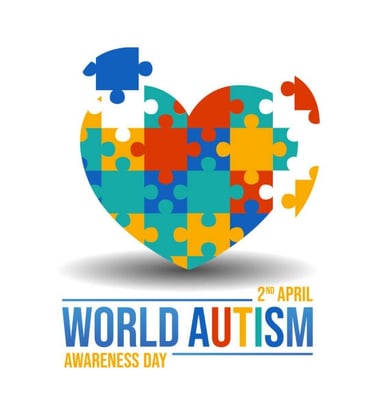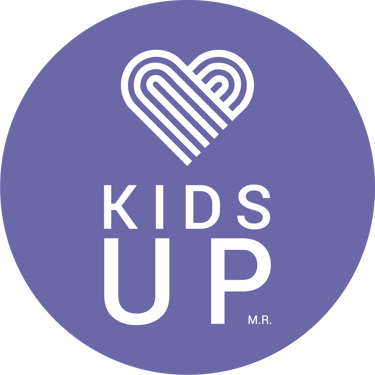Autism Day: For True Inclusion
Promoting the inclusion of people with autism in our society requires a comprehensive approach, covering different areas such as education, employment and social inclusion. It is everyone's responsibility to work together to ensure that people with ASD can develop their full potential and enjoy a full and dignified life.
Kids Up
4/3/20245 min read


Autism Day, celebrated on April 2 each year, is an opportunity to promote awareness and inclusion of people with Autism Spectrum Disorder (ASD) in society. Autism affects communication, social interaction and behavior of people who suffer from it. People with autism may have difficulty establishing social relationships, communicating effectively, and exhibiting repetitive patterns of behavior. Although it can be diagnosed from a young age, it is important to note that each individual with autism is unique and presents a wide range of abilities and challenges.
The diagnosis and symptoms of autism
The diagnosis of autism is based on the observation of the specific behaviors and characteristics of each person. Symptoms can range from difficulties in verbal and non-verbal communication, repetitive behavior patterns, restrictive interests, and difficulties in social interaction. It is essential that parents and caregivers watch for these signs and seek professional evaluation if they have concerns about their child's development.
The role of parents and caregivers in early intervention
Once a diagnosis is made, parents and caregivers play a crucial role in supporting and early intervention for children with ASD. It is important to establish a structured and predictable routine, provide emotional and social support, and seek specialized therapies that fit the child's individual needs. Early intervention can make a significant difference in the development and well-being of children with autism.
The Importance of Collecting Accurate Data on Autism
Despite the advances in awareness and understanding of autism, there is still a lack of precise data on the magnitude of this population in our country. It is paradoxical that despite the new legal frameworks, in instruments as relevant as the Census, collect specific data on this population. This makes it difficult to plan and implement appropriate programs and services for people with autism. It is essential that authorities and health professionals work together to collect accurate and up-to-date information about autism in our society.
Promoting the inclusion of people with autism
Furthermore, it is important to promote the inclusion of people with autism in all aspects of society. This involves guaranteeing access to inclusive education, employment opportunities, adequate health services and accessible public spaces. Inclusion not only benefits people with autism, but also enriches our society by fostering diversity and acceptance.
The (ASD) and its different manifestations
Autism manifests itself in different degrees of severity, which is known as Autism Spectrum Disorder (ASD). Some people with ASD may have high intellectual and language abilities, while others may have intellectual disabilities and speech difficulties. It is important to remember that autism is not a disease, but rather a neurodiverse condition.
The diagnosis and treatment of autism
The diagnosis of autism is usually made in childhood, although in some cases it can go unnoticed until adulthood. The symptoms of autism can vary widely from person to person, making diagnosis often a complex and multidisciplinary process. Health professionals, such as psychologists, psychiatrists, and occupational therapists, can evaluate a person for signs of autism and provide an accurate diagnosis.
Support and inclusion of people with autism
Once a diagnosis has been made, it is important to provide appropriate support and treatment to people with autism. There are different therapeutic approaches that can help improve communication, social interaction and behavior in people with autism. These may include speech and language therapy, occupational therapy, behavioral therapy, and specialized educational programs.
In addition to therapeutic support, it is essential to create an inclusive and supportive environment for people with autism. This involves educating society about autism and promoting the acceptance and inclusion of people with this condition.Autism awareness and understanding can help reduce stigma and ensure that people with autism have equal opportunities in all aspects of life.
It is important for parents and caregivers to educate themselves about autism spectrum disorder (ASD) to better understand their children's needs and challenges. As children with ASD grow, they may face difficulties in different areas of their life, such as education, social interaction, and autonomy.
In the educational field, it is essential that teachers and school staff are trained to work with children with ASD. This includes the implementation of teaching strategies adapted to the individual needs of each child, as well as the promotion of an inclusive environment free of discrimination. It is important that children with ASD receive appropriate support to develop their academic and social skills, and to reach their full potential.
In terms of social interaction, children with ASD may have difficulty establishing and maintaining relationships with their peers and other people. It is important to promote their inclusion and acceptance in society, providing them with opportunities to participate in social and recreational activities. Additionally, it is essential to educate the community about ASD and promote empathy and respect for people with this disorder.
Finally, it is essential that children with ASD develop autonomy skills to be able to function independently in daily life. This includes activities such as self-care, time management, and decision making. Parents and caregivers can help their children develop these skills by providing support and opportunities to practice them in a safe and structured environment. It is therefore essential to include them early in the school system from early childhood education, which enhances their abilities and development.
In the educational field, for example, it is essential to guarantee that children with ASD have access to inclusive and quality education from preschool level. This involves not only the adaptation of educational content and methodologies, but also the training of teachers and education professionals in inclusive teaching strategies and in managing the specific needs of students with autism. Likewise, it is important to promote awareness and respect among classmates, so that there is an environment of acceptance and mutual support.
Social inclusion and access to health services for people with autism
In the workplace, it is essential to promote the inclusion of people with autism in the labor market. This involves not only eliminating barriers and prejudices, but also offering employment opportunities adapted to the skills and needs of each individual. Companies can play a key role in this regard, implementing inclusion policies and providing support and training to their employees with ASD.
Promoting the inclusion of people with autism in our society requires a comprehensive approach, covering different areas such as education, employment and social inclusion. It is everyone's responsibility to work together to ensure that people with ASD can develop their full potential and enjoy a full and dignified life.
What can I do today for ASD Inclusion? Let us promote institutions that work to support families and their children every day with very little or no support from the State:
Ama Crecer Foundation: ASD Inclusion from Early Childhood
Truly inclusive preschool education
The Ama Crecer Foundation is an institution that seeks to provide educational and therapeutic support to children and their families, giving them the opportunity to be part of a community that strives to be a bridge to true inclusion. Learn more about her at https://centroamanacer.cl/
Apply-Share-Spread Kids UP


